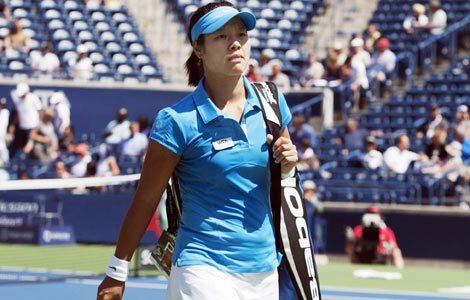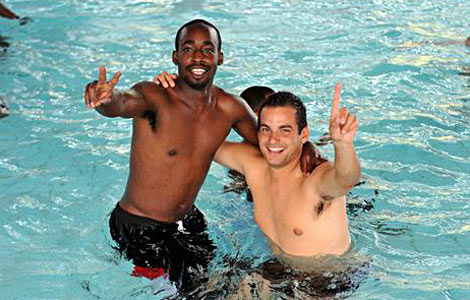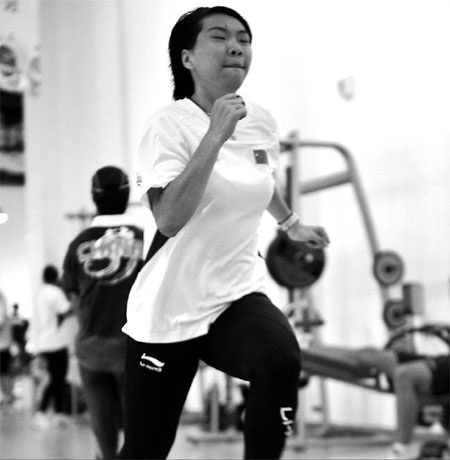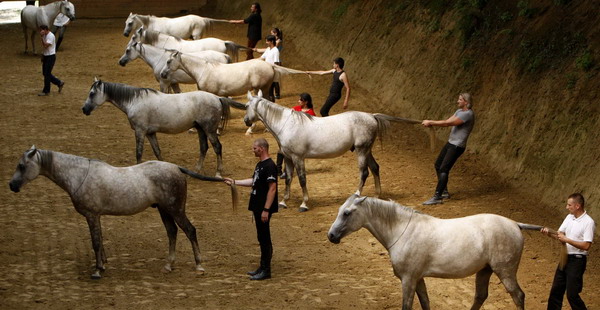For the love of sport
Updated: 2011-08-12 08:18
By Sun Xiaochen (China Daily)
|
|||||||||||
|
A Chinese athlete runs during a training session on Wednesday in Shenzhen to prepare for the coming Universiade Games. Photo Provided to China Daily |
Chinese athletes not just chasing gold at the Shenzhen Universiade, writes Sun Xiaochen
It's not whether they win or lose. Really. The Chinese delegation at the Universiade is shrugging off the medal count, saying it's more interested in making friends and learning from the experience.
"It's more important for us to attend and to compete rather than win. We came here without any goals for the medals, (hoping instead to) enjoy the gala event," said Yang Liguo, executive head of the Chinese delegation, after the opening of the Qiaodan Team China reception center on Wednesday.
Yang said the competition at the University Games was just as good as that at the Olympics, but stressed the young athletes should focus more on their off-field performance.
"The Universiade is a transitional platform for the youngsters to test their abilities on an international stage ... They can gain experience for bigger events," he said.
"More important, it's a great chance to share different cultures, show China's new generation a lively image and broaden their horizons for their future lives."
Still, Yang said the Chinese team would compete in all 24 events, and should perform at world-class levels in what have traditionally been strong events like diving, gymnastics and table tennis.
"If the delegation can perform at the caliber it's been training at ... China should finish in the top three on the medal table," Yang said.
China has attended all 17 University Games since 1979, claiming a total of 276 gold medals and seeing numerous Olympic and world medalists emerge.
China's iconic hurdler, Liu Xiang, grabbed his first international title at the Beijing Universiade in 2001, while "Diving Queen" Guo Jingjing started to dominate the pool after wrapping up three golds at the same games.
"The event provides a bridge from excellence to greatness. Leaving the results behind, young athletes should compete hard and improve," said Yang.
Ma Xindong, team leader of the athletics squad, said China can use the event as a catalyst to improve the relationship between university-level athletics and professional athletics.
China's college athletes, who are trained outside the state-run system, are short on elite guidance, while professional athletes usually struggle to earn a living after retirement due to their lack of education.
"It's been divided since the beginning because of our special systems. But now, it's time to make a difference," said Ma, who is the vice-director of Tsinghua University's department of physical education.
"At this event, we can witness how good the US student athletes are after training and competing in the NCAA system. The merging of college education and professional training in our country should be accelerated after the games."
According to Ma, 71 freshmen and sophomores from 35 universities form the athletics team for the Shenzhen Games. About half train on campus, while the others practice with local teams.
"No matter where they train, they have to reach all the academic requirements and pass the exams as normal students do before taking part in competitions," Ma said.
Ma encourages his student athletes to choose non-sports majors, or at least select some optional courses in other fields to keep them "rich in mind".
"When they find they don't want to be a professional sportsman after graduation, I hope they have other options to begin their careers," said Ma, who used to be a volleyball player before earning a PhD in exercise physiology.
(China Daily 08/12/2011 page23)
- Rising enmity haunts China-Japan relations
- France reports zero second-quarter GDP growth
- Hu: Universiade to boost youth sports
- Conoco admits new oil spill source
- 54 high-speed trains recalled
- 77 hospitalized in E China after eating lobsters
- Obama vows new ideas to boost jobs
- Cameron denies austerity drive caused UK riots
Hot Topics
Anti-Gay, Giant Panda, Subway, High Speed Train, Coal Mine, High Temperature, Rainstorm, Sino-US, Oil Spill, Zhu Min
Editor's Picks

|

|

|

|

|

|








